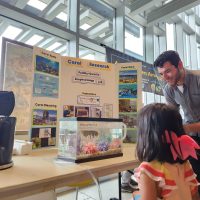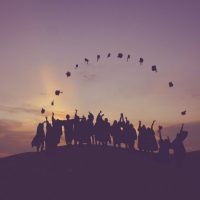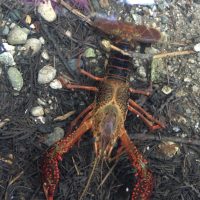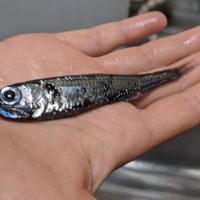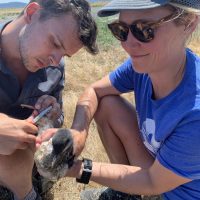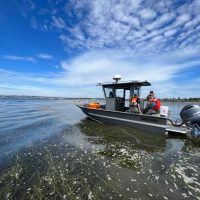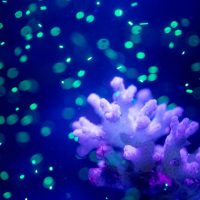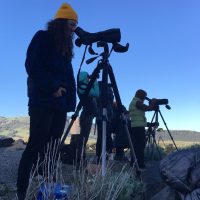Filter Results
SEAS Open House featured on FOX 13 Seattle news
The UW Aquatic Sciences Open House was featured in a 2-minute segment on FOX 13 Seattle, showcasing the breadth of research and highlighting the importance of Open House events for accessibility and inspiring a new generation of scientists.
Read moreSAFS Spring Graduation will be held on 9 June
SAFS welcomes graduates, friends, family and other members of the UW community to the annual UW School of Aquatic and Fishery Sciences Graduation Celebration, held on Friday, June 9, as we celebrate the 2022-23 graduates.
Read moreInternational presentation made possible with FINS award
We spoke with PhD student Helena McMonagle about her use of the FINS award to facilitate travel to a conference in Norway, where she presented her research abroad for the first time.
Why was this conference useful for you to attend?
The Effects of Climate Change on the World’s Ocean (ECCWO) is a conference that now takes place every few years in a different country.
Read moreGEODUC Team Receives College of Environment’s Outstanding Commitment to Diversity Award
Immersive fieldwork, a bridge program for community college students, a unique research opportunity – these are just some of the ways to describe the GEODUC program, whose team has been awarded the College of the Environment’s Outstanding Commitment to Diversity, Equity, Inclusion, Justice and Accessibility Award.
The GEODUC program – which welcomes transfer students each September into the UW marine geosciences – is led by José Guzmán, (Marine Biology and SAFS), Mikelle Nuwer (Oceanography), Kerry Naish (Marine Biology and SAFS), LuAnne Thompson (Oceanography), and Jane Dolliver (Dean’s Office, College of the Environment).
What aquatic invaders are among us? Find out at the SEAS Open House
What are aquatic invasive species? How did they get here, are they spreading, and should we be worried?
At the Freshwater Ecology and Conservation Lab booth during the SEAS Open House on 21 May, you will learn about invasive species in our Washington waterways and what you can do to limit their introduction and further spread. If you are brave enough, you can even touch a live invasive red swamp crayfish (pictured above)!
A cautionary tale: deep sea exploitation and five reasons to be careful
A team of scientists from around the world have joined together to call for a strong precautionary approach in extractive activities in the deep sea, as the science needed to evaluate risks lags far behind.
Joining scientists from Oregon State University, University of California Santa Cruz, National Institute of Water and Atmospheric Research in New Zealand and University of Bergen in Norway, Helena McMonagle from the School of Aquatic and Fishery Sciences (and a guest student at Woods Hole Oceanographic Institution) worked on the study published in Communications Earth & Environment.
Transform into a seabird ecologist at the SEAS Open House
Did you know that seabirds link the ocean and the land? They forage for food in the ocean and nest on the land, making them an important part of two very different ecosystems.
At the booth organized by the Converse and Gardner labs at the SEAS Open House, you will learn about seabirds and the methods we use to study them.
Summer fieldwork in the Salish Sea
What fieldwork did the Applied Ecology Lab get up to last summer? Mark Scheuerell, Associate Professor at SAFS, shared insights into Washington’s aquaculture and some of the research underway at his lab.
Washington is the nation’s leading producer of farmed clams, oysters, and mussels, contributing nearly $200 million to our economy and supporting over 1900 jobs. Accordingly, there is demand for growth within the shellfish aquaculture industry, but a key impediment to doing so sustainably is that we don’t have a firm grasp on the ecological implications of converting nearshore habitat to shellfish production.
Jacqueline Padilla-Gamiño’s research on microplastics in marine ecosystems featured by UW News
Tiny pieces of plastic in the ocean might seem innocuous on their own, but their growing presence is a frustrating issue facing marine ecosystems. The particles’ small size makes them difficult to clean up, and it also allows them to easily burrow into marine environments or even get ingested by ocean organisms.
Read moreGraduate student-led GRFP workshop announces 5 awardees this year
Now in its 12th year of being held at SAFS, a workshop led by graduate students to support applicants for the National Science Foundation (NSF) Graduate Research Fellowship Program (GRFP) is celebrating the successful award to five students this year.
The NSF GRFP aims to ensure the quality, vitality, and diversity of the scientific and engineering workforce of the US and broaden participation in science and engineering of underrepresented groups.
